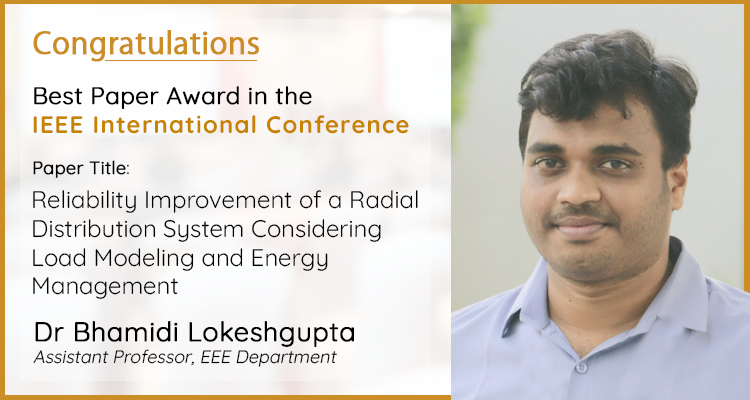Recent News
- Enhanced dynamic performance in DC-DC converter-PMDC motor combination June 22, 2022
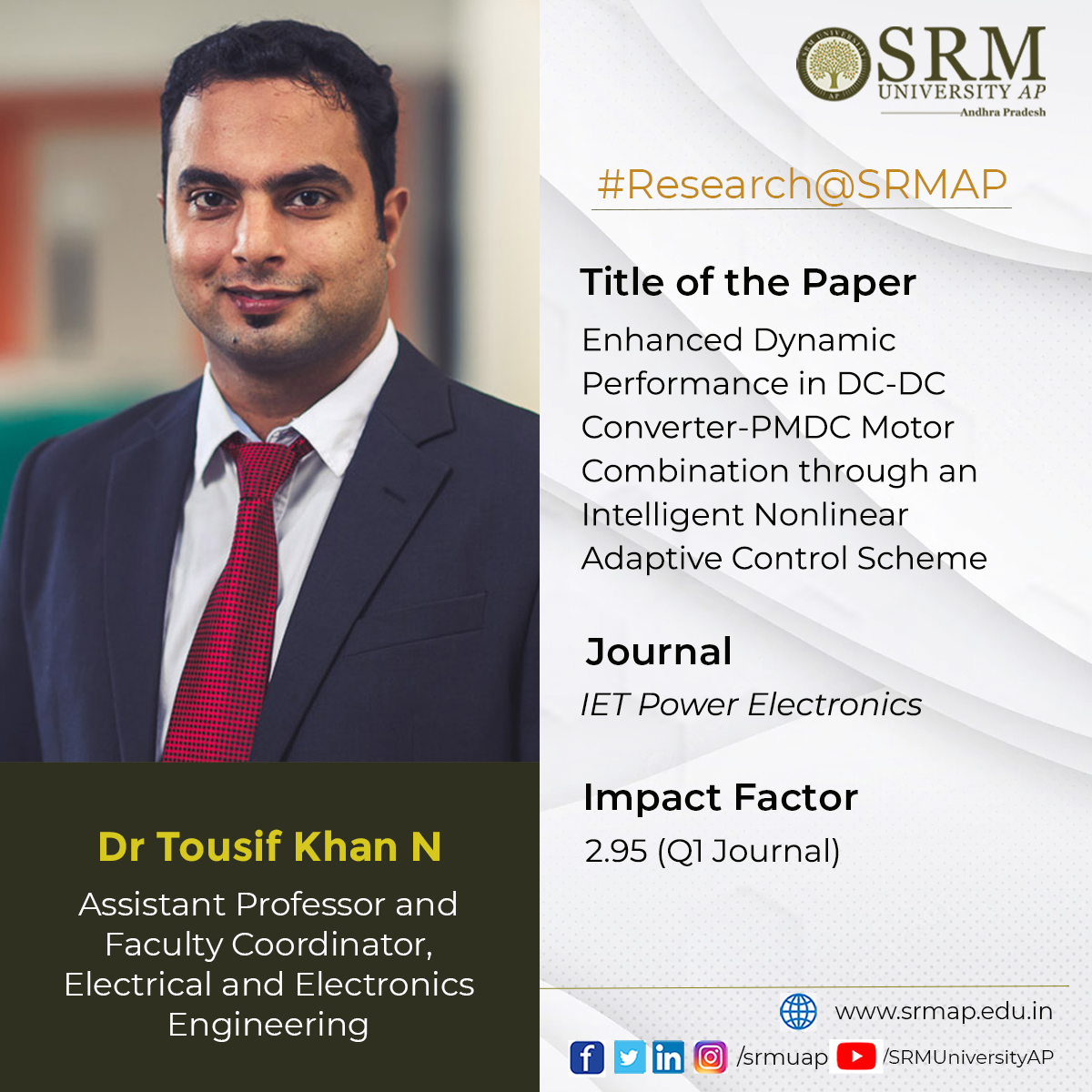 “Enhanced Dynamic Performance in DC-DC Converter-PMDC Motor Combination through an Intelligent Nonlinear Adaptive Control Scheme”, is the latest paper published by Dr Tousif Khan, Assistant Professor of EEE Department at SRM University-AP in the reputed IET Power Electronics (Q1 journal) having an Impact Factor of 2.95.
“Enhanced Dynamic Performance in DC-DC Converter-PMDC Motor Combination through an Intelligent Nonlinear Adaptive Control Scheme”, is the latest paper published by Dr Tousif Khan, Assistant Professor of EEE Department at SRM University-AP in the reputed IET Power Electronics (Q1 journal) having an Impact Factor of 2.95.Abstract
A novel neuro-adaptive control scheme is proposed in the context of angular velocity tracking in DC-DC buck converter-driven permanent magnet DC motor system. The controller builds upon the idea of backstepping control. The proposed method guarantees a rapid recovery of nominal angular velocity tracking under parametric and non-parametric uncertainties. In order to verify the performance of the proposed neuro-adaptive speed controller, extensive experimentation has been conducted in the laboratory under various real-time scenarios. Results are obtained for start-up, time-varying angular velocity tracking and under the influence of highly non-linear unknown load torque. The performance metrics such as peak undershoot/overshoot and settling time are computed to quantify the transient response behaviour. The results clearly substantiate theoretical propositions and demonstrate an enhanced dynamic speed tracking under a wide operating regime, thus confirming the suitability of the proposed method for fast industrial applications.
Continue reading → - Dr Tousif Khan published in Springer Nature June 20, 2022
The Department of Electrical and Electronics Engineering is proud to announce that the estimable book of Springer Nature, ‘Soft Computing: Theories and Applications’ has featured three publications by Dr Tousif Khan, Assistant Professor. His publications are part of the book series, Lecture Notes in Networks and Systems (LNNS), Volume 425. The book stimulates discussions on various emerging trends, innovations, practices, and applications in the field of soft computing, ranging from data mining, prediction analysis, control systems, image processing, health care, medicine, agriculture analysis, supply chain management and cryptanalysis etc.
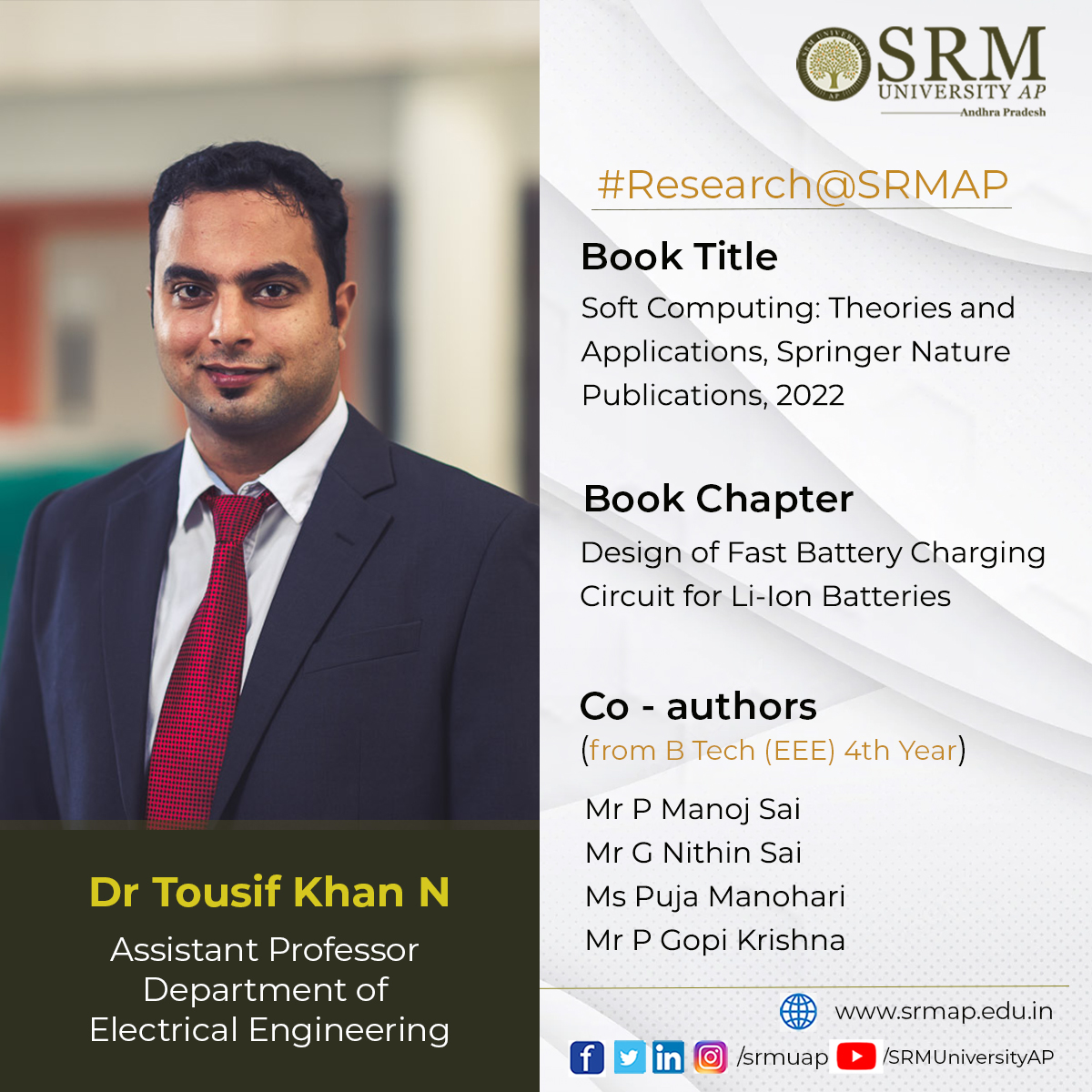 The first chapter titled “Design of Fast Battery Charging Circuit for Li-Ion Batteries” was co-authored by Dr Khan along with the final year EEE students; P Manoj Sai, G Nithin Sai, Puja Manohari, and P Gopi Krishna. In this chapter, a battery charging topology has been designed and developed for the fast charging of Li-ion batteries. The charging circuitry comprises a Proportional-Integral-Derivative (PID) controlled DC-DC buck converter system for reducing the charging time in Li-ion batteries. Battery charging time depends on several factors and the charging current is one of the major criteria. In this work, the buck converter is used to attain a high charging current, besides providing the regulated voltage to the battery. Initially, the AC supply obtained from the mains is converted to DC using an AC-DC rectifier. The rectifier output is further fed to the buck converter to increase the output current of the circuit. The buck converter reduces the output voltage and increases through it.
The first chapter titled “Design of Fast Battery Charging Circuit for Li-Ion Batteries” was co-authored by Dr Khan along with the final year EEE students; P Manoj Sai, G Nithin Sai, Puja Manohari, and P Gopi Krishna. In this chapter, a battery charging topology has been designed and developed for the fast charging of Li-ion batteries. The charging circuitry comprises a Proportional-Integral-Derivative (PID) controlled DC-DC buck converter system for reducing the charging time in Li-ion batteries. Battery charging time depends on several factors and the charging current is one of the major criteria. In this work, the buck converter is used to attain a high charging current, besides providing the regulated voltage to the battery. Initially, the AC supply obtained from the mains is converted to DC using an AC-DC rectifier. The rectifier output is further fed to the buck converter to increase the output current of the circuit. The buck converter reduces the output voltage and increases through it.The circuit parameters are designed by considering the commercially available Lithium-ion battery LIR18650 as the load with a capacity of 2600 mAh and a nominal voltage of 3.7 V. The considered battery requires a standard charging current of 0.5 A, however, the circuit is designed to provide the rapid charge current of 1.3 A as the output by using the buck converter. The converter is operated in continuous conduction mode and helps in charging the battery under constant current mode. To avoid interruption to the charging current when there is a simultaneous discharge of the battery, further improvement in the closed-loop control action is made by employing a PID controller. Extensive simulation work has been conducted using the MATLAB/Simulink tool. The results obtained suggest there is a significant reduction in charging time under different conditions compared to the conventional method of battery charging.
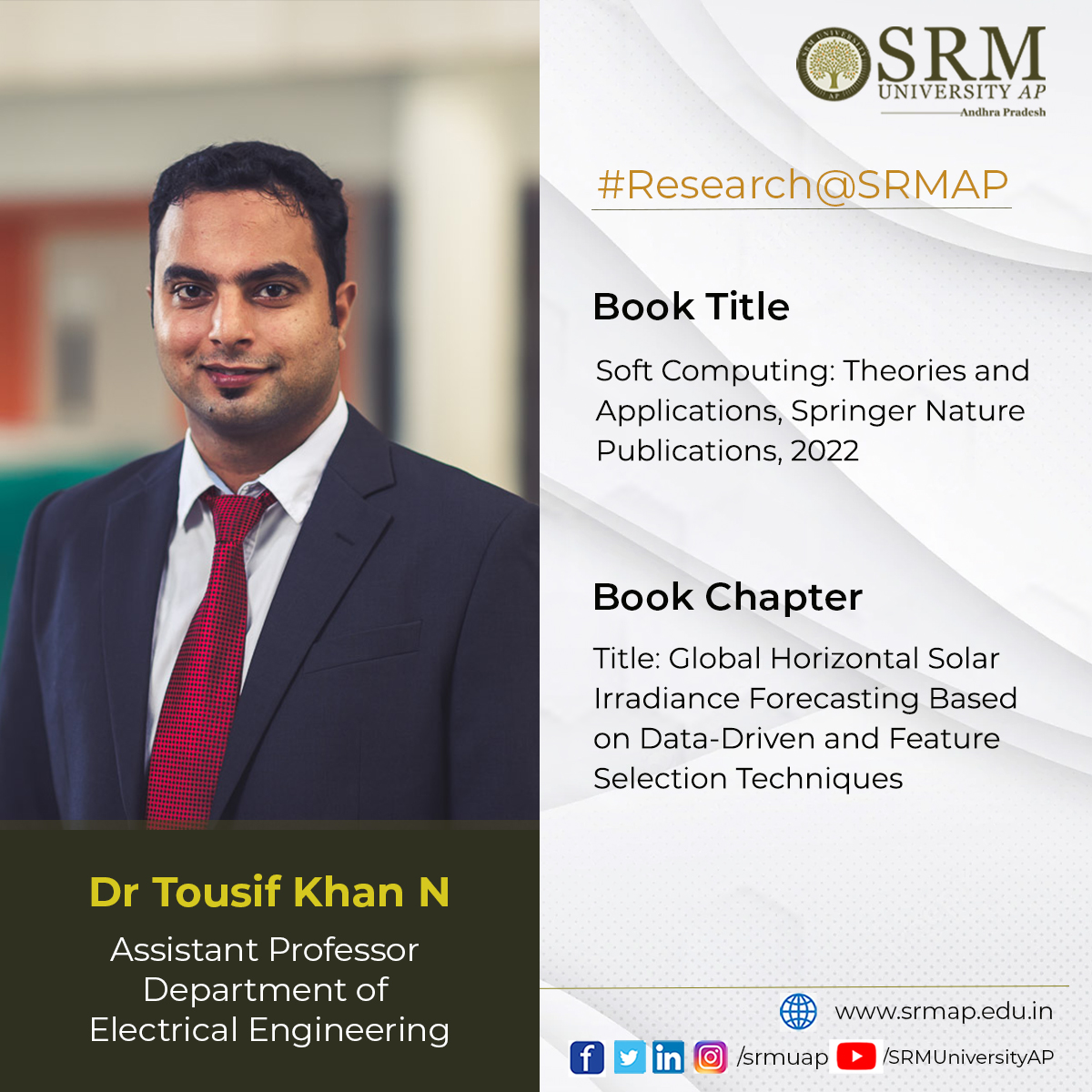 In the chapter, “Global Horizontal Solar Irradiance Forecasting Based on Data-Driven and Feature Selection Techniques”, Dr Khan discusses the need for an accurate solar prediction. It has become an essential part of the renewable energy sector with the rapidly expanding infrastructure of the solar energy system. Over the past decade, various machine learning (ML) algorithms have been used for this purpose. Although the prediction of solar irradiance forecasting has been discussed in many studies, the use of meta-heuristic optimization techniques has not been explored to select features for the forecasting model. This study comprises two meta-heuristic optimization techniques such as simulated annealing (SA) and ant colony optimization (ACO) for feature selection. The results show that feature selection based on meta-heuristics gave better results than models without feature selection.
In the chapter, “Global Horizontal Solar Irradiance Forecasting Based on Data-Driven and Feature Selection Techniques”, Dr Khan discusses the need for an accurate solar prediction. It has become an essential part of the renewable energy sector with the rapidly expanding infrastructure of the solar energy system. Over the past decade, various machine learning (ML) algorithms have been used for this purpose. Although the prediction of solar irradiance forecasting has been discussed in many studies, the use of meta-heuristic optimization techniques has not been explored to select features for the forecasting model. This study comprises two meta-heuristic optimization techniques such as simulated annealing (SA) and ant colony optimization (ACO) for feature selection. The results show that feature selection based on meta-heuristics gave better results than models without feature selection.Amongst the two optimization methods, ACO outperformed SA with some exceptions. For SA, the declining order of performance observed is extreme gradient boosting (XGBoost), random forest (RF), multilayer perceptron (MLP), decision tree (DT) and support vector regression (SVR), while for ACO the declining order observed is XGBoost followed by MLP, RF, DT and SVR. This manuscript indicates the potential capability of meta-heuristic techniques for accurate prediction of global horizontal irradiance (GHI) given a wide array of feature variables.
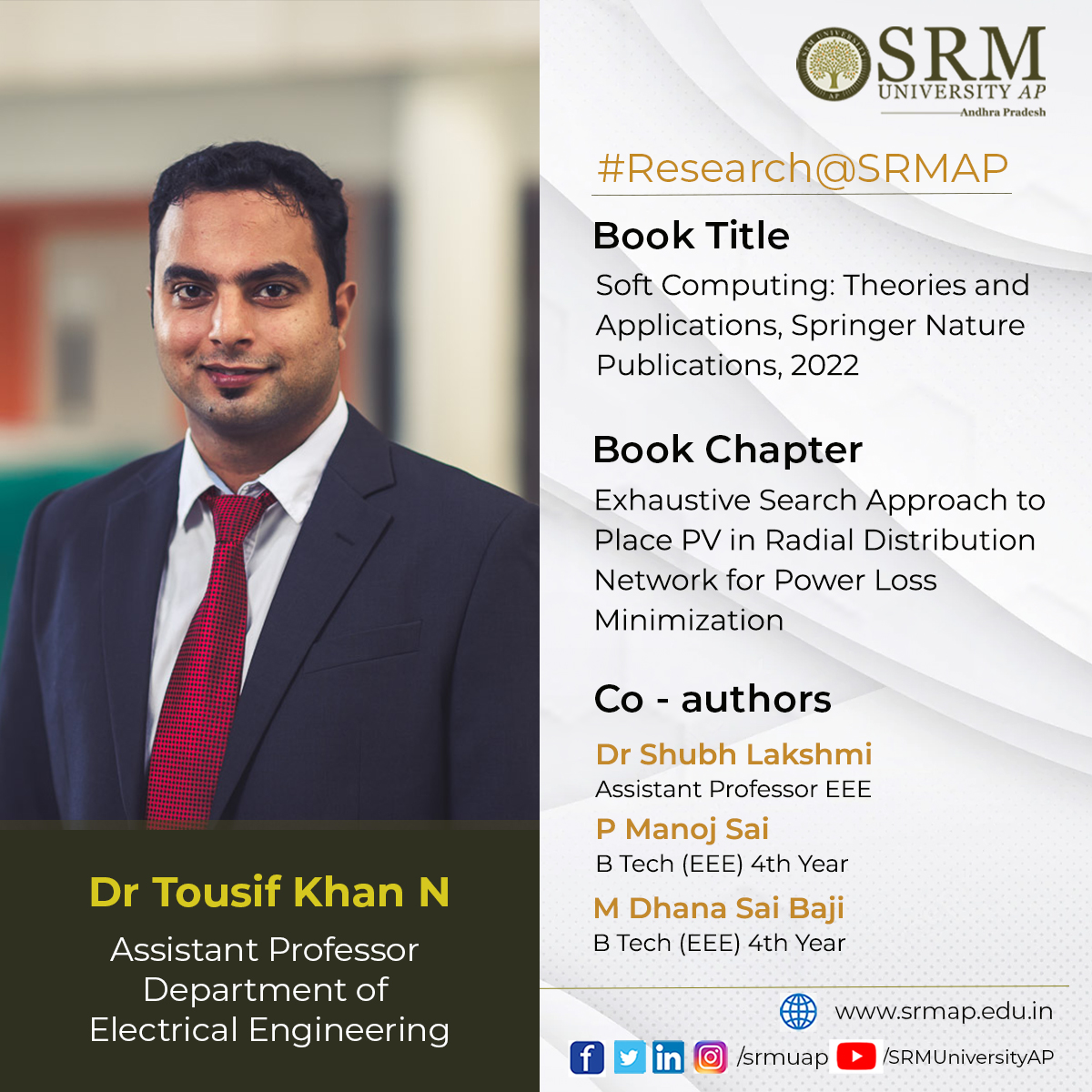 In yet another chapter, “Exhaustive Search Approach to Place PV in Radial Distribution Network for Power Loss Minimization”, co-authored with Dr Shubh Lakshmi, Assistant Professor, and the final year students; P Manoj Sai and M Dhana Sai Baji from the Department of Electrical and Electronics Engineering, an exhaustive search approach to determine the best location and size of PV placement for power loss minimization of radial distribution networks is discussed. In this approach, the network power loss is determined by placing PV in each location, one at a time, and the size of PV in the same location is varied between 10 and 300 kW with an increment of 10 kW.
In yet another chapter, “Exhaustive Search Approach to Place PV in Radial Distribution Network for Power Loss Minimization”, co-authored with Dr Shubh Lakshmi, Assistant Professor, and the final year students; P Manoj Sai and M Dhana Sai Baji from the Department of Electrical and Electronics Engineering, an exhaustive search approach to determine the best location and size of PV placement for power loss minimization of radial distribution networks is discussed. In this approach, the network power loss is determined by placing PV in each location, one at a time, and the size of PV in the same location is varied between 10 and 300 kW with an increment of 10 kW.The combination of location and size of PV which provides the minimum network power loss can be the best location and size of PV for power loss minimization of radial distribution networks. The forward–backward sweep load flow algorithm is used to incorporate the PV model. The 33-bus radial distribution network is used to demonstrate the approach. The simulation results show that the placement of a suitable size of PV in some specific locations significantly reduces the network power loss.
Publishing the latest advancements in Networks and Systems, The LNNS series will serve as an edifying read for all the researchers and scientists across the globe. Volumes published in LNNS give a deep insight into all aspects and subfields of, as well as new challenges in, Networks and Systems. The series encompasses the theory, applications, and perspectives on the state of the art and future developments relevant to systems and networks, decision making, control, complex processes and related areas, as embedded in the fields of interdisciplinary and applied sciences, engineering, computer science, physics, economics, social, and life sciences, as well as the paradigms and methodologies behind them.
- Guest Associate Editor in ‘Frontier in Control Engineering’ journal May 13, 2022
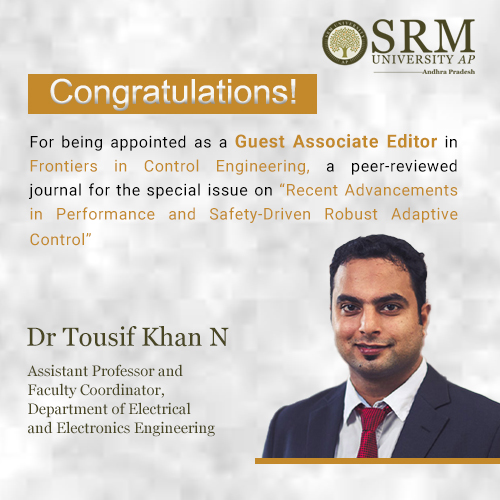 The Department of Electrical and Electronics Engineering is Proud to inform you that Dr Tousif Khan N, Assistant Professor, and Faculty Coordinator, has been appointed as a Guest Associate Editor in Frontiers in Control Engineering, a peer-reviewed journal for the special issue on “Recent Advancements in Performance and Safety-Driven Robust Adaptive Control.”
The Department of Electrical and Electronics Engineering is Proud to inform you that Dr Tousif Khan N, Assistant Professor, and Faculty Coordinator, has been appointed as a Guest Associate Editor in Frontiers in Control Engineering, a peer-reviewed journal for the special issue on “Recent Advancements in Performance and Safety-Driven Robust Adaptive Control.”This Research Topic is intended to give an insight into the latest development regarding the control design and analysis for the nonlinear systems under multiple uncertainties, matched and unmatched disturbances, measurement noises, actuator/sensor faults, and non-smooth nonlinearities. To render a promising control performance under resource-constrained communication networks, state constraints, control constraints, and other related issues are additional design objectives and the focus of this Research Topic.
In conclusion, developing an effective onboard implementable control approach for dynamical systems where safety, performance, uncertainty, and optimality are dealt with concurrently is the main objective of this special issue of the research journal Frontiers in Control Engineering.
Continue reading → - High gain boost converter fed inverter for better power supply April 26, 2022
The Department of Electrical and Electronics Engineering is glad to announce that Dr Ramanjaneya Reddy, Assistant Professor; his students, Mr Rahul Kotana and Ms SK Hima Bindu have published a paper titled “High Gain Boost Converter Fed Single-Phase Sine Pulse Width Modulated Inverter” in the journal ‘International Journal of Renewable Energy Research’ having a Scopus site score of 4.2.
Abstract of the Research
A high gain boost converter fed single-phase voltage source inverter with its control for DC to AC power conversion in uninterrupted power supply and renewable energy applications is presented in this paper. The conventional DC-DC boost converter with a coupled inductor and switched capacitor is utilised to obtain high gain. Further, the output voltage of the inverter is controlled by the sinusoidal pulse width modulation technique. The detailed design and analysis of a high gain boost converter fed single-phase voltage source inverter is presented. The sine pulse width modulation control scheme for the voltage source inverter is also developed and presented. To validate the high gain boost converter fed single-phase voltage source inverter, the simulation model is developed in the LTspice software environment, and the results are validated. The results show high gain boost converter achieves a gain of about 10 and the single-phase voltage source inverter can provide an rms voltage of 228 V without using the step-up transformer. The total harmonic distortion of output current is found to be below 4.
About the Research
Energy is an essential factor for the functioning and economic development of the industrialized world. It plays a key role in our day-to-day life. On the other hand, energy management has become a critical factor for our successive economic prosperity. The energy consumption process frequently needs either DC-AC conversion or AC-DC conversion. The DC-AC conversion finds its major application in uninterrupted power supply (UPS) and renewable energy (RE). To supply during power outages, most UPS systems use batteries, usually lead-acid, as the storage mechanism. The battery is supposed to provide the backup in the absence of the grid supply. However, the voltage provided by the battery alone may not be enough to provide the backup. At first, the battery output power which is DC needs to be converted to AC with the help of an inverter. Apparently, the output of the inverter needs to be stepped up with the help of a step-up transformer to achieve an output of 220V 50Hz. An alternative approach to the same process is by using a power electronic converter called the DC-DC boost converter. The boosting of battery/PV voltage can be achieved with the help of a standard boost converter as shown in Fig. 1(b), or by using a battery capable of supplying higher voltage and a step-up transformer as shown in Fig. 1(a). High power batteries and step-up transformers can be eliminated if a high gain boost (HGB) converter is used instead of a standard boost converter. The HGB converter fed DC-AC conversion system is presented in this paper which eliminates the step-up transformer. The circuit configuration of the proposed work is depicted in Fig. 2.
Practical Implementations of the Research
The DC-AC conversion method proposed is based on the HGB converter fed single-phase SPWM inverter. The proposed model is best suited when a low voltage DC supply is available, and a standard 230V AC output is needed to deliver the load. The detailed design and analysis of the HGB converter are carried out, and the gain of the converter is achieved at around 10, which is very high compared with conventional boost converter topologies. A unipolar SPWM control scheme is developed in LTspice to control the single-phase VSI. The simulation results of the complete DC-AC conversion system are in close agreement with the design parameters. Further, the total harmonic distortion of the output current waveform is around 4% which is well below the international standards. In addition, the complete model consisting of both HGB converter and single-phase VSI are successfully simulated for an input of 36 V DC and produced an rms output voltage of 228 V.
In future, the DC-AC conversion method based on a high gain boost converter can be extended with the three-phase voltage source inverter with electric drive applications.
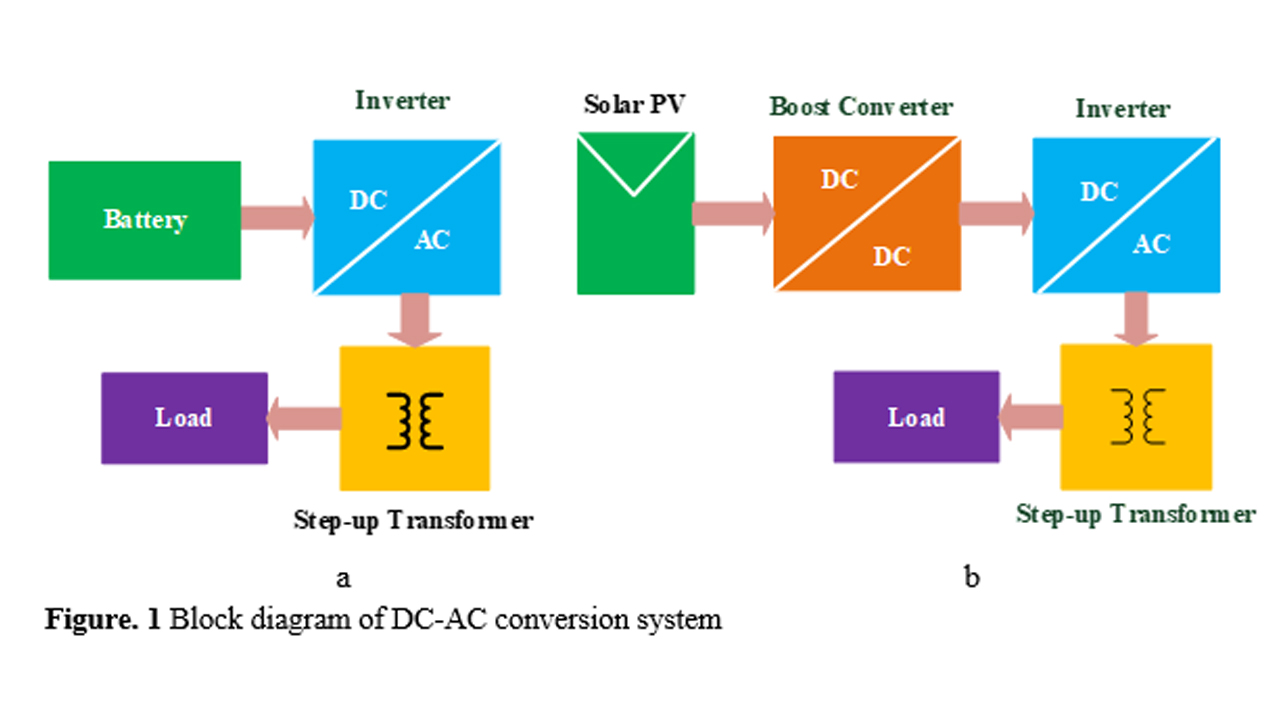
Continue reading →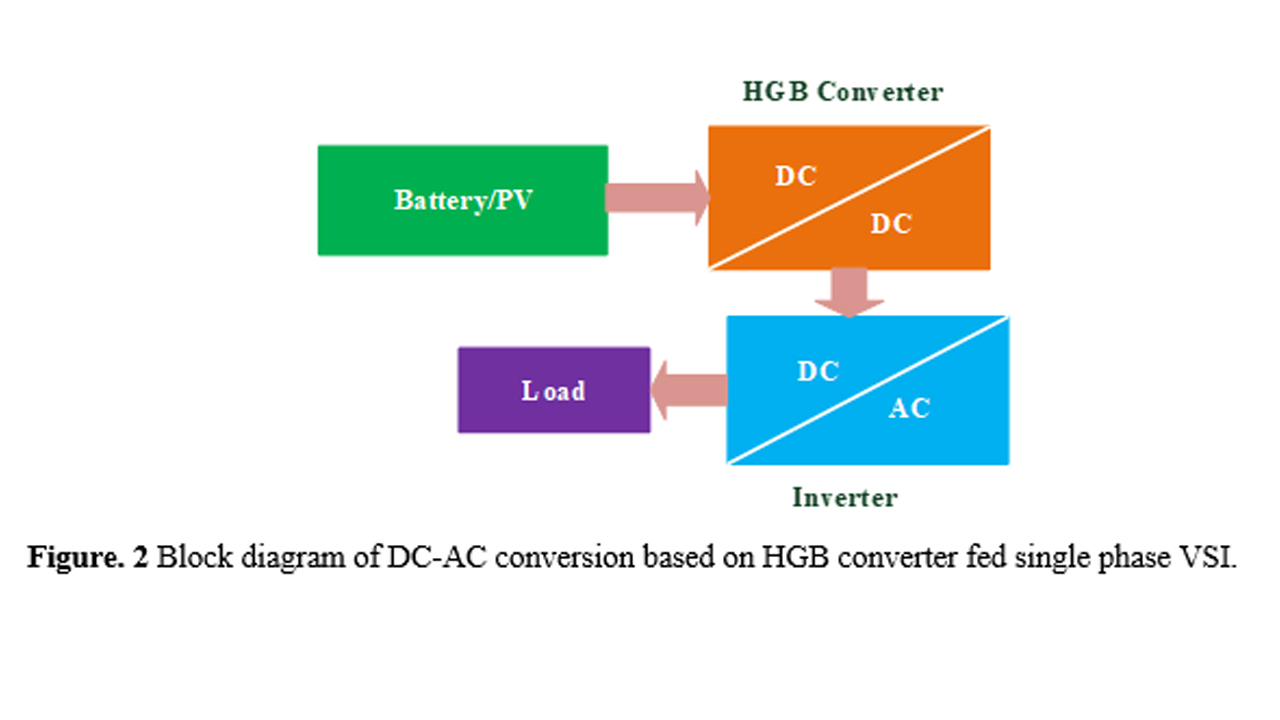
- Dr B Lokeshgupta received the Best Paper Award March 28, 2022
Studies that open new possibilities into some of the gripping issues in the scientific domain have transformed SRM University-AP into the epicentre of cutting-edge research and investigations. We are proud to announce that Dr B Lokeshgupta, Assistant Professor of the Department of Electrical and Electronics Engineering has won the Best Paper Award at IEEE Second International Conference on Power, Control and Computing Technologies ICPC²T 2022 held at NIT Raipur, Chhattisgarh. The paper titled “Reliability Improvement of a Radial Distribution System Considering Load Modeling and Energy Management” was co-authored by Dr S Sivasubramani and Mr. Ram Prakash from IIT, Patna. The research gives new insight into energy management and power consumption patterns.
Abstract of the Research
Increasing energy demand and recent advancements in electrical and distributed generation (DG) technology have made power systems complex. Therefore, the reliability assessment is important for efficient planning and operation of distribution networks. The system reliability can be improved with optimal DG integration and energy management schemes. This work mainly studies the impact of optimal DG planning with an energy management scheme on the reliability of radial distribution network. Usually, the reliability of a power system is evaluated using the distribution system reliability indices which are based on load point and customers. The voltage-dependent load model and time-varying load profile for different load classes are included in this work for pragmatic planning. Particle swarm optimization (PSO) algorithm is used to find the optimal site and size of DG units and optimal scheduling of the shiftable loads. The proposed model of optimal DG allocation with energy management is evaluated with a case-based analysis. The modified IEEE 33-bus distribution system is considered in this model to demonstrate the improvement of reliability and operational parameters. Simulation results verify the efficacy of the model.
About the Research
In recent decades, a high load growth rate and frequently changing power consumption patterns are observed due to urbanization and industrialization. Also, the increasing penetration of renewable-based DG has caused a significant mismatch between power generation and electricity demand pattern. This mismatch introduces reliability and power quality issues with loss of energy and revenue to the utilities in power systems. Thus, various energy management programs are carried out by utilities to encourage consumers to change their load patterns. This paper proposes a reliability improvement technique in a radial distribution system by optimal planning of disperse generation and energy management programme.
Social Implication
The research proposes an offline algorithm for the efficient planning and operation of radial distribution networks. Simultaneous deployment of distribution generation (DG) and energy management system (EMS) makes the network more reliable compared to just DG allocation. Application of DG and EMS also improves other operational parameters of the network like power loss and voltage profile.
In future, the energy management concept can be extended with the inclusion of neighbourhood power-sharing model in the environment of multiple smart home consumers and prosumers.


